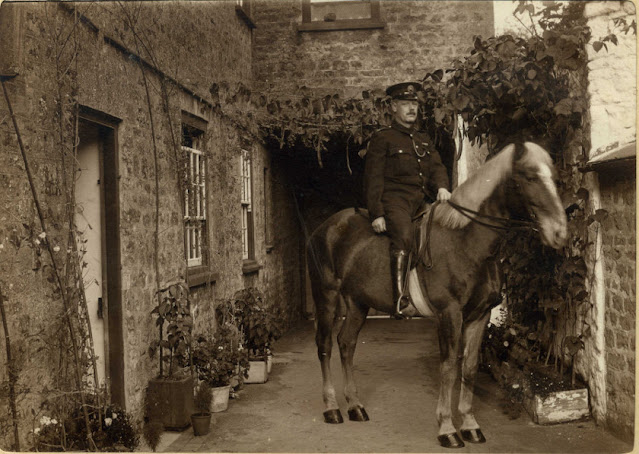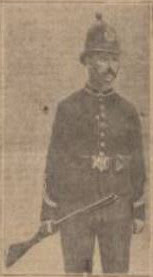Featured
- Get link
- X
- Other Apps
The "Vexed Question" of Motor-cars for Superintendents of Police
In this post Photographs of Beaminster Police station 1920 to 1925 I wrote that Grandad Beck may have had two horses to get his trap up the steep hills. From the Western Gazette, January 1920 in a report of the Standing Committee meeting I found conformation of this. The Chief Constable repeatedly asked the committee to provide the Superintendents with cars, but they thought this unnecessary and extravagant. We must remember that in the early 1920s the country was recovering from the First World War and the financial situation was difficult. Prices were fluctuating, up then down. Farmers were having a hard time, especially in Dorset which had one of the highest county rates in the country.
Superintendents needed to travel around their Divisions not only to supervise the local men but also to attend the local courts and other events. Grandad Beck attended courts at Beaminster, Bridport and Lyme Regis. I would assume that appearance of the Superintendent, clean and tidy uniform, was desirable at these occasions. This may have been one reason the Chief Constable was not in favour of motor-cycles, the roads would have been very dusty in the 1920s.
Dorset Constabulary were having to cope with changing priorities and keep within their budget. In 1920 Weymouth had its own police force which merged with Dorset Police Constabulary in the interest of greater economy. We also learn that a Police Constable looked after the Superintendents horse or in Grandad Beck’s case horses. It seems that it was the shortage of PC’s, that eventually lead to the horses being fazed out. I will write more about this next week.
 |
| Superintendent (Grandad) Beck in uniform with his wife Rebecca in a horse and trap C.1920 |
Replace the horse and traps?
In January 1920 The Chief Constable (Captain D Granville) reported that great difficulty was being experienced by the Superintendent, who resided at Beaminster, in supervising his scattered division. He made frequent visits to Bridport, Lyme Regis and Charmouth, and he asked that a motorcar instead of two horses and traps be provided. The police Sub-Committee considered an alternative suggestion that a motor-cycle should be provided, but did not consider this suitable, having regard to the duties and the hilly district. Mr J. Wyatt called attention to a resolution already passed, that the question of providing motor-cars for the police should be postponed for 12 months, and the chairman thereupon ruled the question out of order. Mr Cole thought a "scooter" would be the best means of locomotion. (Laughter).
So it seemed that the Superintendents carried on with their horses and traps. In October of the same year the papers again reported on the The "Vexed Question" of Motor-cars for superintendents of police” The Sub-Committee were unaimoughly of opinion that the time had arrived when the work would be much more efficiently done if motor-cars were provided than under the present system, and it was suggested that cars be provided for Blandford, Sherborne, Beaminster, and Dorchester. … Captain H.G.S Bowe: thought that the reasons why motor-cars should not be purchased were stronger to-day than they were when the question first came up, for in every way cost had gone up. He could not see why superintendents should not get about on motor cycles. During the war men of 50 and 60 years of age got about on motor cycles, and he did not think it was out of place to ask police superintendents to do the same. He did not propose that they should go back to horses, but four-seater motor-cars were the other extreme. (Hear, hear)…. In answer to a question the Chief Constable stated that there were, at the present time, motor-cycles at headquarters at Dorchester, Wimborne, Shaftsebury, and Sturminster…. The Chief Constable stated that if all division were to have motor-cycles he would want six more, two superintendents were not able to ride them so that would leave only four as the number required. … Eventually it as decided that the question of purchasing motor-cycles be postponed. I think it unlikely that one of those unable to ride a motor-cycle was Grandad Beck, as he was younger than some of the other Superintendents at the time. Yet again the horses continued to be used and looked after by the Divisions. The Chief Constable had to come up with another idea.
Weymouth police force
Amalgamation of police forces into county forces was a policy all over the country. Weymouth still have their own separate police force in 1920 and were in discussions for Dorset Constabulary to take over the administration of the Weymouth force. In July 1920 Colonel T. A. Colfox stated that the Police Sub-Committee had adopted the view that an amalgamation of the Weymouth Borough Force with the county was desirable. It had been recommended that all separate police forces in the non-county boroughs should be merged in County Forces. Weymouth Police force was amalgamated into the Dorset force on 1st April 1921 this increased the strength of Dorset Police by 33 men. The Superintendent of Portland was moved to Weymouth and now had the problem of visiting all areas, in his enlarged division, where the trains didn’t go.
 |
| Grandad Beck riding one of the horses at Beaminster Police Station |
Hire a Car?
In January the following year, 1921, it was suggested that in some divisions, the horse provided for the superintendent might be dispensed with, and the superintendent by authorised to hire a motor-car when necessary, where the trains do not serve. … where a horse is dispensed with a constable is released for regular police duty. The committee returned to this question again in May 1921 when the Chief Constable authorised the Superintendents of the Wareham and Weymouth division to hire motor-cars as and when found necessary for the proper supervision of the outlying portions of their divisions. … dispensing with a horse … that would be a saving of money and release a constable for more useful and necessary work. In November the horse at Dorchester Division had become unfit for further police work, and the above arrangement extended to Dorchester. The experiment, he said [chief constable] had been tried at Weymouth and Wareham, and at both these places the hire of cars had cost considerably less than the keeping of a horse with a man to look after it… the recommendation was agreed to. In February 1922 the Chief Constable reported that at Dorchester The cost of the Superintendent's travelling by motor car for the quarter ended 31st December has been £9 3s 10d, a saving of £7. 18s 1d. We must assume that Grandad Beck was still using his two horses but perhaps he was hiring a car to get to Lyme Regis, his furthest and most hilly journey. This issue of the Beaminster/Bridport Division doesn’t come up again. The next year some Superintendents suggested another solution to this problem.
Provide our Own Cars?
In July 1922 Superintendent Barrett of Sherborne Division offered to provided his own motor-car for police work if an allowance in lieu of horse and cart was provided. After discuss the allowance of £65 per year was agreed on. In May 1923 the Police and General Purposes Committee reported that the experiment had been fully justified. This was now extended to the Superintendents of Dorchester and Wimborne and in July Supt. Lawrence of Blandford was granted the car allowance. A year later in July 1923 Supt. White transferred to Poole Division but didn't receive the grant on the ground that they [sub-Committee] considered that in the Poole Division which was purely urban, there was sufficient other meant of locomotion available. We know that Grandad Beck never had his own car, he preferred to use taxis. I wrote about the taxi and driver here.
All original content by Sylvia Collins is copyright protected.
Ref: Quotes in italics
Western Gazette
1920: 30 January; 23 July; 29 October
1921: 04 February; 06 May; 25 March; 04 November
1922: 03 February; 05 May; 28 July
1923: 04 May; 27 July
- Get link
- X
- Other Apps
Comments
Popular Posts
The Wilfully and Malice Murder of Winifred Mitchell
- Get link
- X
- Other Apps


[…] serve. … where a horse is dispensed with a constable is released for regular police duty. See last weeks post for more on this […]
ReplyDelete[…] The Chief Constable further requested that the Superintendents of the enlarged divisions be provided with a Motor-car. Colonel Colfox, reminded the committee that seven carts and seven horses and eight motor-bicycles were provided for the Superintendents. Also a motor-bicycle and side-car was provided for the Deputy Chief Constable at headquarters. In the view of the Chief Constable, the cost of adoption of motor-cars would be considerably cheaper to maintain than the current cost of horses, forage and other items. Motor-cars would also be more efficient and useful for the police work. The Chief Constable recommended the purchase of motor four-seater cars for all the divisions except Poole, and one for Headquarters. Members of the committee felt the purchase of motor-cars was too expensive at that time. Mr. Webb thought they ought to refrain from pampering the police any further. The motion was proposed and carried that the purchase of motor-cars for the police be postponed for twelve months. The Chief Constable would need to purchase two horses, to replace those he was short. I wrote about the eventual solution to this issues in my post entitled The “Vexed Question” of Motor-cars for Superintendents of Police […]
ReplyDelete